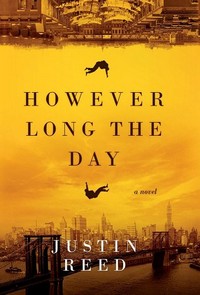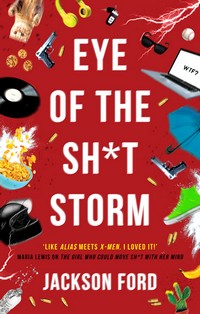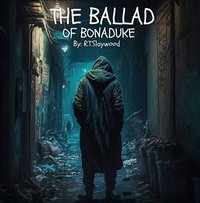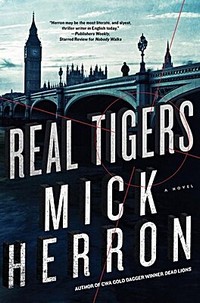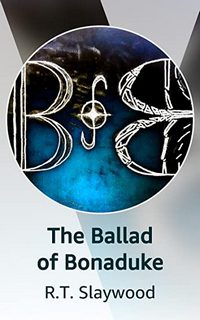by Justin Reed
DETAILS:
Publisher: Bulrush Press
Publication Date: February 15, 2022
Format: Hardcover
Length: 402 pgs.
Read Date: August 8-11, 2023


What’s However Long the Day About?
This is a The Prince and the Pauper-esque story set in New York in 1918 with the son of a wealthy politician and an activist mother hiring his doppelganger, a recent Irish immigrant, to stand in for him for one night. Fredrick (the rich guy) got caught (again) doing something reckless and is about to be subject to a lecture/tirade from his father before being sent to his room for the evening (a room, it should be noted, that’s bigger than the apartment Niall is sharing with his uncle). Sure, it’s ridiculous that someone in his early-to-mid-20s (I’m guessing) is being treated that way. But if he wants to siphon off of his parents, I’m guessing he has to put up with ridiculous things like this.
I’d better move on before I open another parenthesis.
Niall was offered more money than he could make in a year, so he has to sign on. This kicks off 12 hours (or so) of mistaken identities, women kissing the wrong me, kidnappings, abductions, fights, beatings, criminals, police, criminal police, plots being hatched, secrets being exposed, plans going awry, plans coming to fruition, and so much more.
Frederick Philips
Frederick is a spoiled and apparently useless man desperate to get out from underneath his father’s thumb. He’ll do anything to accomplish that, except get a decent job and put in an honest day’s work. He needs to live in the manner to which he’s become accustomed, and there’s no way he can do that easily. I’m pretty sure Archie Goodwin would call him a “fop,” and although that word’s not really used anymore, it feels rather fitting (and not just because of the setting for the book).
He appears to have tried gambling and some other hare-brained (and likely illegal) schemes that have put him on the wrong side of at least one crime syndicate. One of the things he’s trying while Niall pretends to be him is the culmination of a lot of his scheming—he’s trying for the big score that’ll equip him to set up a new life in Philadelphia.
Niall Donovan
Niall has been in NYC for a month and we meet him as he’s struggling to substitute for his Uncle Paddy on his ice delivery route. Paddy’s fighting off the Spanish Flu* and needs someone to cover so he can keep his job. Niall’s not that good at the fairly thankless job, but it’s a way he can contribute.
* The grief given to the police officer wearing a mask—and his defending the practice—feels pretty timely.
Other than in appearance, Niall’s everything that Frederick isn’t—he’s a hard worker, he’s honest and honorable—and can acquit himself well in a fight. You’ll have a really hard time not being immediately charmed by him and wanting to see him succeed everywhere. He might be so loyal, so devoted, so determined to do the right thing that he puts himself in some stupid and dangerous situations, quite honestly. And more than once you’ll shake your head at him making a choice that’s sure to lead to problems—but you’ll still root for him.
Other Characters
Frederick’s ally/accomplice in all this is named Ivy. She lives near him, with parents in a similar social standing—she’s equally miserable but doesn’t have the means to get away from home. She’s a little more level-headed than Frederick and works with him—urging him to take some chances for both of their sakes.
Flora works in domestic service for one of the homes on Paddy’s route and Niall is pretty sweet on her (the feeling’s mutual). She’s hands down my favorite character in the book—she’s everything that Niall is (but backwards and in high heels), but generally thinks more clearly (except for the one time she encourages Niall’s foolhardiness. Both of them end up regretting that). I wish I could tell you all the reasons I love Flora, but that’d involve spoilers.
Niall’s Uncle Paddy is a great guy, too. He’s doing all he can (in his very limited way) to help Niall acclimate to New York and to get established.
And I’m going on too long—I can’t talk about all the great characters—but Reed’s got a knack for creating characters that come to life. There’s not one of them that you’re not going to have a very solid impression of—and probably a pretty good mental image for (despite minimal description in the text). I could’ve easily enjoyed more scenes with each and every character—except maybe Frederick—because I just enjoyed watching them in action so much.
The Object Itself
Most of the time I don’t talk about things like covers, printing, and whatnot—it’s just not something I want to dwell on (and frequently it’s stuff outside an author’s control). But when it’s done this well—particularly by a self-published author, I want to take a moment to talk.
The printing, binding, and so on for this book is top-notch. Indistinguishable from most of the hardcovers on my shelf. The cover design as well as the interiors were done with skill and care. Does this help the reading experience much? Probably only a negligible amount. But it’s clear that Reed put some money into the production end of this—money and care. As much effort into that as he put into the words on the page (or close).
I wonder if he regrets that—or if by trimming a few costs, he’d be closer to making a profit. But for me? I appreciate an author putting their money where their mouth is. Again, I don’t know if it added much to the experience, but I sure enjoyed that part.
So, what did I think about However Long the Day?
As far as I can tell—Reed nailed the historical setting. His NYC of 1918 looks and feels like histories of the era that I’m familiar with—and with books from around that era that I’ve read. I’m no expert by any means, but it felt accurate—and if I raised an eyebrow at any of his historical details, they didn’t bother me enough to remember or write in my notes. I’m open to correction on this point, but I’d say he dealt with this part well.
I’ve talked briefly about the characters already, so let’s move on to the plot. It took a while for a clear picture to develop about what was going on, but the ride to that point was so fun, I really didn’t care—I just kept wondering what the next scene would bring. Sure, there were some moments early on that I wondered if he was trying to juggle too many storylines and characters, and I will admit to shaking my head a few times when he’d throw in something new or insert a new difficulty or obstacle for Niall or Frederick to overcome. Eventually, I started to see the tapestry he was weaving and was glad to see that patience rewarded—Reed knew where he was going and led us on a straight path that only seemed to be meandering.
Every now and then, I wondered if Reed was hitting either Niall and Paddy’s Irishisms* a bit too hard—or if he was laying on the 1910s jargon/slang a bit too thick. But it was less often than I assumed I’d think something like that going in—and it really was rare that I wondered that. There was a time or two that I wondered if the dialogue in general was a bit preachy (whether or not I agreed), or wordy in general.
* Flora using the term “Irishism” also seemed a bit strange, but it worked in the moment so well, that I’m not going to complain. And not just because it was Flora who said it. Although that helps. I’m telling you, I loved her.
But overall, I was really impressed with Reed’s writing. Near the 300-page mark I got a little uneasy. There was maybe 30 pages of story left, how was he going to fill up another hundred or so? It turns out that it was super easy, barely an inconvenience. Not only that, it was some of the best story-telling he’d done up to that point. Most of it didn’t even depend on the mistaken/interchangeable identity aspect of the book. It’s not often that I misjudge an author’s pacing anymore, especially not a first-time author (and when I do, it’s generally not a good thing)—but Reed taught me a welcome lesson in humility there.
I was pleasantly surprised throughout this book—I didn’t expect anything much to strike me as funny when I picked it up, for example. I was optimistic about the premise and anticipated enjoying it. But I expected a fairly earnest, straightforward drama. But Reed gave us some good action, some interesting hijinks, and some solid comedy. (Yes, there’s a chance that I found things funny that I shouldn’t have…I’ll grant you that, and apologize to Reed if that offends him).
One example of the comedy that really stood out to me–there’s a recurring discussion about the choice of cake vs. fruit pie. It feels straight out of Tarantino, or maybe Jim Gaffigan. It essentially becomes a personality test–and Frederick fails, incidentally. It becomes this nice bit of humor, it helps solidify Flora as a character, it humanizes some of the gangsters (see Tarantino), and is something that really helps the reader to connect with the characters. The fact that it has almost nothing to do with the plot is a great bonus, it becomes something where the characters can interact as human beings regardless of what’s going on. Also, anything that allows Flora to shine and makes Frederick look bad is worth pointing out.
Clearly, I enjoyed this book a lot. If this is what Reed can do for a debut, I can’t wait to see what he accomplishes for a follow-up. I strongly recommend you all to go pick this one up.

This post contains an affiliate link. If you purchase from it, I will get a small commission at no additional cost to you. As always, the opinions expressed are my own.


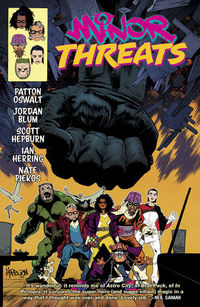 Minor Threats: A Quick End To A Long Beginning
Minor Threats: A Quick End To A Long Beginning

![]()





